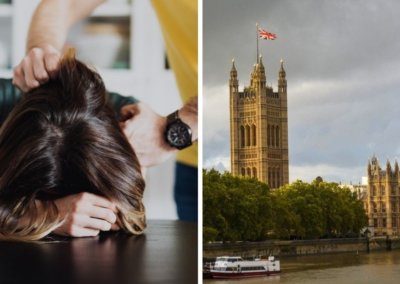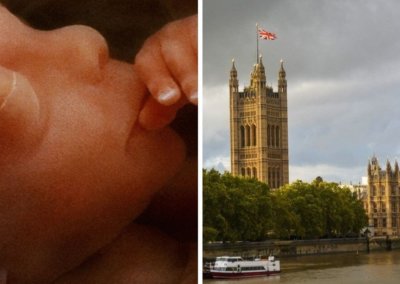Two radical amendments have been tabled to the Domestic Abuse Bill by Diana Johnson MP ahead of the final stages of the Bill in the House of Commons which will take place on Monday 6 July.
New Clause 28 seeks to allow both medical and surgical ‘DIY’ home abortions to take place on a permanent basis in any location if a woman is in an abusive relationship.
This new clause goes even further than the Government’s current temporary measure allowing medical and surgical abortions legal outside of a hospital or place approved by the Secretary of State. The current temporary measure allows ‘DIY’ abortions only up to 9 weeks and 6 days’ gestation for safety reasons. However, there is no similar time limit outlined in this amendment.
New Clause 29 seeks to ‘decriminalise’ abortion by repealing sections 58 and 59 of the Offences Against the Persons Act.
This would leave England and Wales with no abortion law through to 28-weeks. This would mean abortion on demand, for any reason (including sex-selective abortion). The change would be the most extreme change to abortion legislation since 1967 and would leave England and Wales with one of the most extreme abortion laws in the world.
The abortion lobby announced their intentions to hijack the Domestic Abuse Bill with these extreme amendments earlier this week, with abortion provider BPAS urging their supporters to lobby MPs ahead of next week’s vote.
New Clause 28: More harm for women
Contrary to BPAS’ claims, and the aims of the Domestic Abuse Bill, New Clause 28 would likely result in a far greater number of women being coerced or forced into an unwanted abortion.
By making both medical and surgical abortions legal outside of a hospital setting or place approved by the Secretary of State and removing the requirement for an in-person consultation, it will be difficult for physicians and providers ascertain if abuse or coercion is involved.
The extreme change could compromise the privacy of the patient and, in theory, could allow an abuser to hide in the background of an ‘electronic’ consultation.
According to an investigation conducted by the Independent last year, already “one in seven women in the UK have been bullied into either getting pregnant or having an abortion.” New Clause 28 does nothing to address this coercion and will likely make the situation much worse.
Earlier this year, a pharmacist and self-styled pastor, who sexually abused children, covered up his crimes on some of his vulnerable victims by obtaining medical abortion pills through his role as a pharmacist.
Dr Gregory Gardner, a longstanding GP and honorary clinical lecturer at the University of Birmingham, has revealed how the radical proposed changes in law could open more children and women up to abuse and coerced abortion.
In an expert witness statement for a UK Court of Appeal legal challenge against ‘DIY’ home abortions, the leading doctor said: “It will be difficult if not impossible to verify by phone or video whether a woman is undergoing any kind of duress to have an abortion.
“There does not seem to have been any consideration given to this in the proposed change in policy. There will be women who need delicate counselling to discover coercion or other forms of abuse.”
Furthermore, by removing the 10-week limit, late-term abortions, similar to the one that caused the death of an unborn baby at 28 weeks in May, will likely become more commonplace.
In addition, it was revealed a further eight cases of women taking ‘DIY’ home abortion pills beyond the current 10-week limit were being investigated.
A number of women have also come forward to share the serious problems they’ve experienced after taking ‘DIY’ home abortion pills.
New Clause 29: Abortion on demand up to 28 weeks
As the Abortion Act was passed to create exceptions to sections 58 and 59 of the Offences Against the Persons Act and Infant Life Preservation Act, a repeal of sections 58 and 59 of the OAPA would effectively result in the majority of the Abortion Act becoming moot.
Repealing these provisions would introduce abortion on demand, for any reason, up to 28 weeks in England and Wales. There would be no abortion law up to 28-weeks.
This would not only leave England and Wales with the most extreme abortion law in Europe, but also allow for sex-selective abortions to take place up to 28 weeks.
Canada has been described as a “haven” for sex-selective terminations, which often single out baby girls due to a preference among certain parents and some cultures for having sons, due to the country’s permissive abortion laws.
Despite the current law, there is also evidence of this practice in the UK, and it is possible that a form of ‘abortion tourism’ could arise from countries which protect unborn babies from sex-selective abortions.
In addition, a number of other safeguards, protecting both women and unborn babies, would be removed from the current law.
There would be no legal requirement that two doctors must certify an abortion, and doctors would no longer be required to participate in an abortion procedure. Instead, healthcare assistants, nurses, and pharmacists could carry out abortions without a trained doctor present in the case of a complication.
Extreme proposals not in line with what women want
The extreme proposals being put forward by BPAS and the abortion lobby are completely out of line with where women stand on the issue.
Recent polling, conducted by Savanta ComRes, on whether time limits for abortion should be increased showed that only 1% of women wanted the time limit to be extended. In contrast 70% of women favoured a reduction in time limits.
Furthermore, a poll from March 2014, showed that 94% of women agreed that a woman requesting an abortion should always be seen in person by a qualified doctor. This current requirement in law would be removed under the abortion lobby’s plans.
A spokesperson for Right To Life UK, Catherine Robinson, said: “It is highly inappropriate for the abortion lobby to hijack the Domestic Abuse Bill in a way that not only undermines its support for victims of domestic abuse and their families, but could also result in women and their babies facing more harm.
“Polling shows that this extreme proposal is not supported by women, with only 1% of women wanting the abortion time limit to be increased beyond 24-weeks.
“MPs should reject these extreme amendments and commit to bringing forward sensible legislation with increased support for women with unplanned pregnancies. This would ensure we were working together as a society to reduce the tragic number of abortions that happen each year.”












